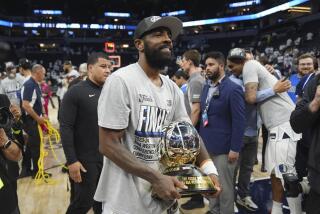Era Will Have Ended When Flying Doctor Comes Back to Earth
- Share via
It was like watching somebody pull the wings off butterflies. Seeing Bambi getting run over by a truck.
There, in front of our eyes in the Forum in Inglewood, young ruffians in purple and gold were snatching basketballs off the head of Dr. J himself, the living legend, the guy who invented the flying dunk, Tom Swift and his electric basketball.
It was outrageous. Like somebody taking a hammer to a religious statue. How could kids you never heard of be doing these things to Dr. J? What could they be thinking of?
Dr. J is old? Julius Erving has slowed down? Nonsense! Dr. J is ageless--like Peter Pan, Orphan Annie, Superman. Why, Dr. J is an American artifact.
He was born on Washington’s birthday. A real live nephew of his Uncle Sam, I once wrote. You were surprised he wasn’t born in the bulrushes. When he leaves the game, it’ll be by swan.
His given name is Julius Winfield Erving II. But Julius Erving is not really the IInd anything. He’s the one, the original. He is the Doctor. He doesn’t so much play basketball as conduct clinics.
In the world of sport, to be identified as the and nicknamed is the ultimate accolade. If you’re the Man, the Babe, the Pearl --or the Doctor-- you’re special.
The Doctor fits Julius Erving. He goes through life with the professorial air of a guy working on a rabies vaccine. He could play basketball in a lorgnette.
Julius Erving did things with a basketball no one ever thought of before. Lots of guys could throw up a 30-foot shot. But they didn’t arrive with it. Julius accompanied his 30-footers.
He never played the game at sea level, like everyone else. Julius just kind of orbited the playing surface. Other players went around their men. Julius went over his. He had more air time than the team plane. If Julius had played in Denver, they would have had to tether him.
There is an axiom in basketball that playground players can’t cut it in the real world. They’re flashy, selfish soloists. They give a recital, they don’t play a game. The team is just a backdrop.
Guys who dazzle the playgrounds get fancy nicknames, too. The Helicopter. Zoom. So, when Julius Erving got his nickname on the blacktops and low ceilings of Harlem summer basketball, the pro scouts figured they had just another one-man band who couldn’t even spell defense, let alone play it.
Even the colleges shrugged. Usually, a player of Dr. J’s caliber goes directly to UCLA, North Carolina, Notre Dame or Marquette. Julius went to the University of Massachusetts, a powerhouse of the Berkshires that was sure to beat Amherst but not apt to get on national TV or even the 11 o’clock news in Holyoke.
But not even if he’d played in Spitzbergen could a guy who could do what he could do hide. That’s why the basketball world gasped when Lou Carnesecca, then the new coach of the New York Nets, turned him down. Julius had decided he’d rather earn some money than play his senior year at UMass, a policy that Carnesecca, a longtime college coach, found distasteful.
So, Erving took his talents to Norfolk, Va., and another ABA team known as the Virginia Squires. A friend noted: “Julius signed with whoever had a pen.” It was like doing Hamlet in Costa Rica.
Julius hammered in so many points in the ABA, 11,662 in five seasons, that when he went to the Philadelphia 76ers, the wise guys agreed that he was going to the right place.
The 76ers of those days were not a team but a bust-out. You didn’t have to get the ball away from the other team, you had to get it away from your own. It was recommended that rebounds be listed as offensive, defensive, and from teammates.
Gag stories read: “The Philadelphia 76ers beat the Philadelphia 76ers here tonight with a dazzling demonstration of ball-hogging. The Philadelphia backcourt completely outplayed the Philadelphia frontcourt while the Baltimore Bullets stood by and watched.”
Dr. J changed all that. With him throwing in 1,770 points and grabbing 503 defensive rebounds, the 76ers reached the NBA playoffs. Within a few years they were either winning the championship or playing for it. Dr. J could play D--as in dynasty.
Time, though, tethers all men. Dr. J arrived in the Forum the other night with 28,461 points. Only two men in basketball history, Kareem Abdul-Jabbar and Wilt Chamberlain, have more.
Julius left the game with 28,467 points. He spent most of the night earthbound and trying to figure out where everybody had gone.
It was like watching Ruth take a called third strike, seeing Nicklaus hit it short, watching Dempsey try to get up.
The good doctor sat in the locker room after the game, throbbing knees and swollen toes surrounded by ice bags. Someone cleared his throat. “Er, Doc, about retirement . . . “
Dr. J looked at him patiently. Dr. J suffers fools graciously. “I haven’t made up my mind,” he said. “I’ll make up my mind at the end of this year.”
Someone said: “You mean you’ll just up and quit like that? No kind of farewell tour? No warning?”
“Maybe,” said Dr. J, coolly.
“Won’t you even leave a note?” scolded the newsman. “You can’t just wander off one night after a game. Cousy wouldn’t do that. Oscar Robertson didn’t.
“We’ll see,” said Dr. J.
One thing is clear: Basketball will be the poorer when there’s no longer the Doctor in the house.
More to Read
Go beyond the scoreboard
Get the latest on L.A.'s teams in the daily Sports Report newsletter.
You may occasionally receive promotional content from the Los Angeles Times.










